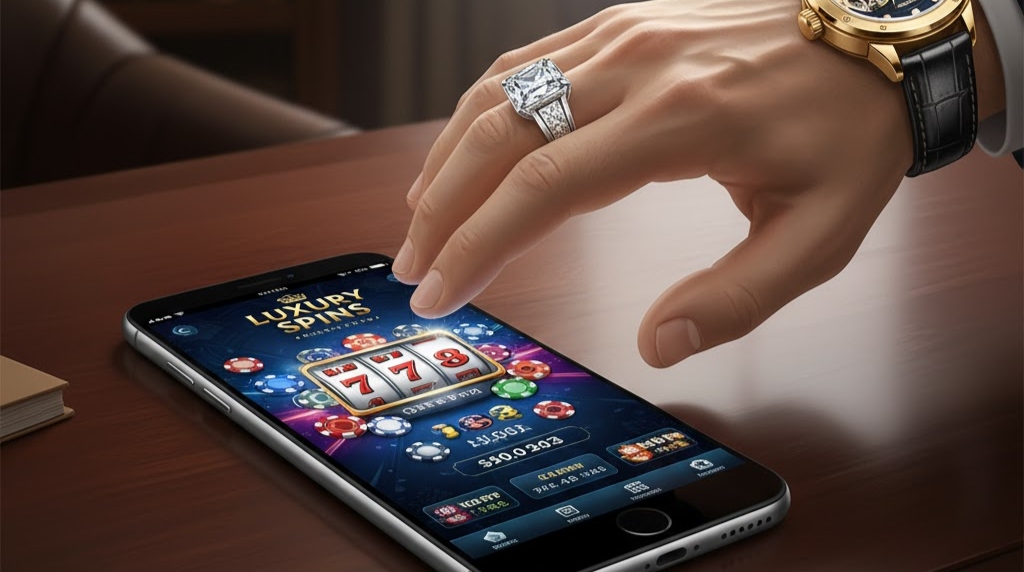US Оnline Casinos Turn to Celebrities to Attract Consumers
Celebrities are the new pitchmen and women of online casino marketing in all their glamorous and occasionally flawed glory. This change has been a major development in the spread of legal gaming in the country.

How celebrity branding helps sell online casinos
Celebrity Endorsement and Online Casinos
Welcome to the new era of American leisure. It is a world where pop culture, sports, and high finance intersect. That means celebrities are sure to follow.
There was a time in the gaming industry when a casino commercial was a subtle suggestion. Perhaps a quick shot of a gleaming roulette wheel, then a tasteful logo. Times have changed, and the marketing volume is now cranked up to eleven.
A very familiar face drives this sonic boom of advertising. In fact, it’s many familiar faces, plastered across every screen you own. It’s the celebrity: the movie or television star; the athlete, even social media influencers.
The involvement of celebrities in changing the face of US casino sites for real money wins has completely redefined the public perception of the industry.
Celebrities advertising online casinos is as common now as seeing a neon sign when you’re in Las Vegas on the strip. It’s transformed a niche, sometimes shadowy pastime into mainstream entertainment.
This shift is not accidental, nor is it a simple celebrity endorsement. It’s a calculated cultural saturation, an integration strategy of the highest order. We are watching American celebrities rewrite the rules for US online casinos.
No question about it: cultural celebrity influence moves the economic needle.
The Legal and Cultural Avalanche
For too long, the United States was a restrictive, frustrating patchwork for gaming. Casinos and sports betting were banned nationwide, outside of Nevada, and in narrow spots in New Jersey. This restriction was a heavy anchor dragging on the entire American gambling ecosystem.
The fall of the Professional and Amateur Sports Protection Act, or PASPA, changed everything. In 2018, the Supreme Court struck down PASPA, unlocking the gates for states to legislate. The ensuing rush to legalize sports betting was nothing short of a stampede.
Sportsbooks launched and scaled at a breathtaking rate, driven by enormous marketing budgets. This legal spread of sports betting became the Trojan horse for online casinos.
Only a small handful of states permit real money online casino play. These markets include trailblazers like New Jersey and Delaware. Pennsylvania, Michigan, and West Virginia also participate. Connecticut is on the list, and Rhode Island recently joined.
This limited geographical reach makes the high volume of national advertising rather interesting. Nevada is the historic gambling capital, but its legal online casino market is limited. The state’s focus is on driving traffic to its world-famous retail casino floors.
Yet, we see ads everywhere that carry the unmistakable aura of the Vegas Strip. This is where the star power of Hollywood and the sports world shines brightest.
Celebrities give the brand national legitimacy, even if the service is regional. They bridge the gap between a state-regulated app and a coast-to-coast audience.
Gambling and celebrity have always been the most delicious of cultural cocktails. It is a pairing that dates back decades, long before fiber optic cables existed.
Las Vegas understood this inherent connection better than any other city. They signed up Frank Sinatra, Sammy Davis Jr., Dean Martin, and the entire Rat Pack in the mid-20th century. These legends were not just entertainers; they were the brand of Vegas cool.
Later, international stars like Celine Dion became synonymous with resort residencies. The celebrity imprimatur meant quality, luxury, and a good time was guaranteed.
The old template was physical: see the star, visit the casino. The new template is digital: see the star and download the application. It is the same human desire for aspiration, but delivered instantly via a mobile device.
The Authority of the Famous Face
When a celebrity endorses a product, it is an appeal to our innate tribalism. We often confuse fame with authority, equating visibility with trustworthiness. The famous face suggests two powerful, primal concepts to the consumer.
First, the gaming brand is legitimate, since a major star has staked their reputation on it. Second, the brand is successful and cool, because a star is associated with it. This is the bedrock of celebrity-driven marketing and works flawlessly on the masses.
It is a shortcut past careful consideration, straight to emotional excitement. I am not suggesting consumers are mindless automatons, but we are susceptible to charm. Watching a beloved actor promote an activity is a simple, aspirational joy.
This is particularly true when the activity hints at luxury and possibility, like casino play.
Sexy Marketing and the Celebrity Pitch
The celebrity campaigns are masterworks in leveraging pop culture and sex appeal. Take Jamie Foxx, a man with an Oscar, a Grammy, and an endless supply of charisma. Foxx was, and continues to be, the face of BetMGM’s sprawling gambling operation.
Foxx’s campaigns blend sports betting with a clear focus on the online casino product. In the “Vegas Lights” commercial, Foxx strolled through the Bellagio and MGM Grand. The message was clear and effective: your phone connects you to this real-world glamour.
Another US online casino operator, DraftKings, has leaned heavily on the boundless energy of Kevin Hart. The comedian’s ads are everywhere, often featuring other sports legends in a whirlwind of quick cuts.
Hart lends the brand an undeniable sense of accessibility, humor, and universal recognition. The ads position the online casino not as a risky venture, but as pure, unadulterated fun.
With his Broadway background, Neil Patrick Harris brought a different kind of panache to Golden Nugget. His ads are charming and musical, hinting at the sophistication of a classic Vegas show.
The clever use of celebrities ensures a demographic spread across all platforms. The sports and film figures capture the betting audience, and the actors capture the general public.
The Ambassador Phenomenon
Today, we see a lot of talk about “brand ambassadors” in every sphere of commerce. The term itself is a fascinating reflection of the modern, interconnected consumer economy.
The brand ambassador concept has ancient roots, dating back to gladiators endorsing products in Rome. It gained steam in the late 1800s when companies began sending products to influencers of the day.
The idea: if an important person used something, the public would trust it implicitly. But the phrase “brand ambassador” really crystallized in the social media age. It suggests an official, almost diplomatic role representing the brand’s values.
The brand ambassador is a higher-level term than a simple celebrity endorsement, which can feel transactional.
An ambassador implies a long-term, deep-seated relationship and genuine product use. It elevates the celebrity from a hired pitchman to a vital part of the brand family.
This strategy has permeated society, making every company seek a face to represent its mission. In gaming, the ambassador is key to building trust in an area that once lacked it.
Paris Hilton & the Social Casino’s Sparkle
Not all celebrity gambling partnerships are with real-money operators. Paris Hilton, the quintessential pop culture icon, has a multi-year deal with WOW Vegas. WOW Vegas is a social casino, meaning players use virtual currency without real-money prizes.
Hilton, via her company 11:11 Media, is not just a face, but an active creative partner.
This partnership sheds light on the future of gaming marketing. Hilton’s audience is vast, digitally native, and perfectly aligned with the social gaming sphere. She brings her unique brand of “sliving”, a mashup of slaying and living, to the platform.
The Hilton campaign connects the casino experience with lifestyle, fashion, and aspirational fun. It makes the online casino space feel shiny, glamorous, and totally safe for a mass audience. This is a master class in using a celebrity’s specific personality to define a product.
The celebrity involvement in online gambling is more than just marketing noise. It’s a profound cultural marker that signals the acceptance of digital gaming.
The days of the smoke-filled backroom image are definitively over, replaced by star-studded commercials. The goal is to normalize online casino play as a standard, legitimate form of entertainment.
As more states continue to legalize online casinos, the influence of these celebrity campaigns will only grow. The celebs are not just selling a product; they’re selling a lifestyle, and a legendary one at that.
We’ll need to keep an eye on star power to emerge on the digital Strip. I suspect the current trend is merely the opening hand in a very high-stakes game.
The face of the US online casino is changing, and it’s looking increasingly familiar and entertaining.
 Reel Love: 5 Slot Games to Match Every Valentine’s Mood
Reel Love: 5 Slot Games to Match Every Valentine’s Mood
 Best Christmas Slots for 2025
Best Christmas Slots for 2025
 7 Politically Incorrect Slots for the Connoisseur Who’s Seen It All
7 Politically Incorrect Slots for the Connoisseur Who’s Seen It All
 Casino Payment Delay Red Flags: When Waiting Is a Concern
Casino Payment Delay Red Flags: When Waiting Is a Concern